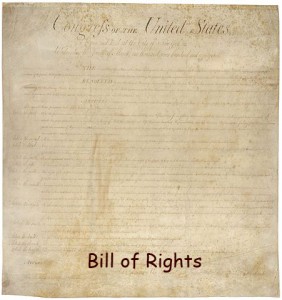Bill of rights amendments kids

The Constitution lays out the organization of our government with three governmental branches. The Constitution doesn’t say much about the rights of the people, though. This concerned the Founding Fathers. In 1789, James Madison offered several amendments to the Constitution which protected individual liberty. Congress approved the additions, which became the Bill of Rights. The Bill of Rights guarantees important freedoms that we often take for granted. Fun Facts
- The first amendment guarantees freedom of religion. People have the right to worship how and where they wish. England had an official religion. Those who wanted to worship differently were often persecuted.
- The first amendment also gives us the right to free speech. The media is allowed free speech too. Members of the media can report the news honestly even if it reflects negatively on political leaders. The first amendment allows people to gather peaceably and complain to the government when they’re unhappy.
- The second amendment gives citizens the right to bear arms (keep guns). It would have been very difficult to win the Revolutionary War if the rebels hadn’t owned guns. The colonists and early settlers also kept guns to hunt for food and for protection.
- The third amendment says that no soldiers can live in a person’s home without that person’s permission. Before and during the Revolutionary War, people were often required to house soldiers whether they wanted to or not.
- The fourth amendment says that a person’s home and property can’t be searched without reasonable cause and without a warrant.
- The fifth amendment guarantees the right to a fair trial. Before someone can be convicted of a serious crime, that person must have a trial before a grand jury. Additionally, a person can’t be tried twice for the same crime or be made to stand as a witness against himself.
- The sixth amendment says that in all criminal prosecutions, people are guaranteed a fair and speedy trial and access to a lawyer. The Founding Fathers knew that without these safeguards, people could be unfairly tried, convicted, and punished.
- The seventh and eighth amendments also discuss the rights given to people convicted of crimes.
- The ninth amendment says that other rights not listed in the Constitution were still guaranteed to the people.
- The tenth amendment states that any power not given to the federal government belongs to the states, or in other words, the people.
Vocabulary
- Guarantee: a formal promise or pledge
- Persecute: to harm, harass, torment, or mistreat someone, usually because of their race or religious beliefs.
Questions and Answers
Question: Are the freedoms promised in the Bill of Rights ever threatened?
Answer: Yes, frequently. In 1797, for example, the U.S. was involved in a short-lived conflict with France. The Federalists created the Alien and Sedition Acts, which said that people who were believed dangerous could be deported or punished. The Sedition Act made it a crime to say anything bad about the government. This is one of the reasons it’s important to pay attention to lawmakers and vote carefully.
Learn More
Visit Scholastic for more information about the Bill of Rights.


